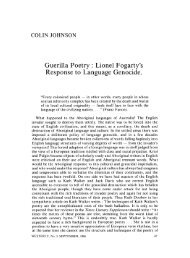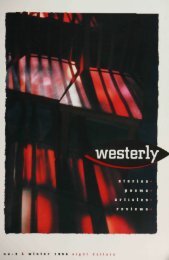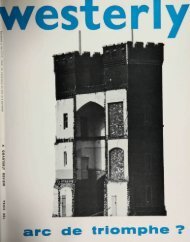living and the dead; that places him within configurations of history and theimmediate that are unique as one experiences them, and mythic as one interpretsthem: life, he'd say, as rhythm, our moving within patterns we exemplify, but donot invent, and only partly control.At the beginning of his collection The Pattern in 1979 Buckley offers a range ofdictionary definitions for that word, a list that instructs us in how to read the poems.The lexical emphases he picks out are these: pattern as a matrix, a mould; an example,an instance; a precedent; a decorative or artistic design; in Ireland, a patron saint'sday, and by transference, the festivities of the day. The short opening title poem thenplaces the word in its largest evolutionary stream. The writing of poetry itself, ifnot a return to the source, then at least is the way we are going to speculate onthat return and find avenues to talk of it.And go to: and come back from:the slow starved patternI follow with inflamed nervesto discover, close to the beginningof all, a tadpole barelyat movement in the clammy water.Origin, as we know, is a dicey concept. It is a place of departure, and a placethat in ancestral terms anyway proliferates as we move back. The closer we cometo our origins, the more places we are taken to, the less anyone origin is possibleexcept under the pressure of geography or historical preference. The pattern weaccept is primarily the pattern we impose, a sense of focus that is there in the actof looking rather than in what we necessarily find. As Buckley puts it,notlone place but ten thousand:not a particular but a generalfish-web of fathers: something so ordinaryyou sit half -suffused with fearin front of it.But this insistence of finding home, to reach what one might call a terminaldefinition, to a certain kind of mind is compulsive. It is also necessary in order toleave 'the beginning' over again, to relate to it on one's own terms; to construct aframework of coherence for one's own experience - in a phrase he uses of the poetAustin Clarke, for "building his maze of short moments". When an interviewer askedBuckley some years ago about Ireland, quoting Eliot's line from "Little Gidding"that the end of our exploring will be to get back to where we came from, Buckleyimmediately observed that the quote was not complete: it should go on, he noted,"and to know the place for the first time". A return that he then related to "anexperience of seeing actual places under an Edenic aspect".18 He phrases it like thisin The Pattern:A first, frail paradise, where the dreamlet down like tendrils, enteringthrough air the airless spongethat would sometime be memory.One might say a good deal about how that last word carries for Buckley aWordsworthian immediacy that is a living nerve into the past, a capacity forvibrations as he loosely put it in that interview, and the expanding sense in ThePattern that coherence and identity are both linguistic and mythic. At a time whencoherence, myth, referentiality, are variously under fire, I would like simply to notetwo familiar propositions of Wittgenstein. "The meaning of a word is its use in the54 WESTERLY, No.2, JUNE, 1989
language" - not its rhetorical figuration, as one might say, but its persistence insocial commerce. And the other, "Our talk gets its meaning from the rest of ourproceedings", which again places us in a communal context.20 I think somethinglike that is in Buckley's own assumptions, driving him on the one hand towardsinherited and - in Freud's word again - 'oceanic' rhythms, but on the other towardsindividual clarity, communication, the harder and simpler line he worked to in hislater poetry. For literature is not a code to be deciphered, nor is it an instruction,but an event to be shared, a pattern of festivity. This is why, I'd guess, Buckley refusedto value Yeats as Yeats sometimes did himself, as a conveyor of secret wisdoms.Buckley's Yeats is a poet of dramatic situations in a modern world.21There are related observations one could make. One is that Buckley's poetry isoften - and I think wrongly - read as that of the cultured academic, or as thatof the nostalgic Australian surrounded perhaps a little too vividly as a child by Irishpeople and Irish things. In other words, middle-class, Melbourne and Cambridgecentred,and yet exhibiting too a kind of latter-day colonial truculence in hisrepublicanism, and in his resolute anti-imperialism in either hemisphere - thepurveyor of a kind of lerilderie letter written by a man who could spell and whodidn't need to shoot the police.We are good, and getting better all the time, at interpreting writers in ways thatcould not have made sense to themselves, practitioners of that "discrepancy theory",as Frank Kermode designates the kind of reading which assumes that the text isalways revealing what it in fact does not assert.22 It is a way of reading that derivesprincipally I suppose from Levi-Strauss's founding claim that it is impossible to bean accurate examiner of one's own society or behaviour, that we cannot fullyapprehend the structures our own lives abide by. It is easy enough to line up Buckley'sapparent dichotomies, the binary forking if you like that his thinking veered between- here (Australia)/there (Ireland), Catholic/humanist, elitist/republican,hierarchical/ liberal, and so on - and then to elucidate the contradictions andsubversions as one term contaminates the other. Well, one could. For the moment,I'd prefer to offer the American philosopher Samuel Wheeler's view of this criticalprocedure:"it seems to me ... that the incoherence of a dichotomy, when it is extended too far,shows nothing about that dichotomy's worthiness. Contradictions that arise when onefollows out a chain of connection do not show that there is anything wrong with thedichotomy in discourse. To suppose so it to value systematisation and totality, rather thanparticular local working. (Only in mathematics do hidden contradictions mean thateverything is a theorem)".23As anyone who has taught Yeats will know, one of the difficulties of those famousdrawings of interpenetrating gyres is to pull the poems back from being mereillustrations of a diagram, and to re-establish them as living exchanges wherecontraries do not imply disabling contradiction.Yet in speaking of Buckley I would certainly use at some point what may seema curious word to apply to him, and that is "transgressive". I think it appropriatebecause when we read him we see how so many of his initial assumptions, whetherof rhetoric, formalism, or belief, are consciously challenged by his own later work;and how much of that work crosses the grain of his contemporaries, whether fellowCatholics at one stage, fellow academics at another, or fellow Australians,much ofthe time. What was constant if you like was that he never had the least doubt thathe understood himself as an Australian by insisting that racially, genetically, it washis Irishness that defined him. Buckley's was a conviction that is commonly distortedby those Australian critics who currently use the term" Anglo-Celt" as a grab-bagword to provide a clutch of mainly negative responses, an oversimplifying that pressesWESTERLY, No.2, JUNE, 1989 55
- Page 3 and 4:
CONTENTSWESTERLYVOLUME 34, No.2, JU
- Page 5: WESTERLYa quarterly reviewISSN 0043
- Page 8 and 9: JAN KEMPTo My Father, M.H.K.My fath
- Page 10 and 11: JAN KEMPThe GypsySuddenly before yo
- Page 12 and 13: WONG PHUI NAMA Death in the WardThe
- Page 14 and 15: WONG PHUI NAMCousinI had to call to
- Page 16 and 17: WONG PHUI NAMObitIt is as thin smok
- Page 18 and 19: So thus I lie here fearful of movem
- Page 20 and 21: VIRGINIA BERNARDA ValedictionWhen N
- Page 22 and 23: "Yeah, yeah," I call, returning the
- Page 24 and 25: she flops for a bit, slurps her tea
- Page 26 and 27: well her students did, she was neve
- Page 28 and 29: English or Indian, that they had th
- Page 30 and 31: ANDREW TAYLORSpringSpring is a dive
- Page 32 and 33: CAROL SElTZERAiming for the MouthTr
- Page 34 and 35: GRAEME WILSONA Selection of Japanes
- Page 36 and 37: a highly ambivalent attitude to his
- Page 38 and 39: Esson attended some rehearsals of T
- Page 40 and 41: the literary life of Bloomsbury. Lo
- Page 42 and 43: Without Yeats Esson would quite lik
- Page 44 and 45: "What theatre do you have in Austra
- Page 46 and 47: In the back room Esson could feel t
- Page 48 and 49: "When we started our little theatre
- Page 50 and 51: a screen against a wall. A theatre
- Page 52 and 53: VINCENT O'SULLIVANSinging Mastery:
- Page 54 and 55: flighty relation in most statements
- Page 58 and 59: quite diverse traditions towards th
- Page 60 and 61: WARRICK WYNNEThe Wetlands (for Liam
- Page 62 and 63: JAN OWENSmileOur mother aimed the b
- Page 64 and 65: RICHARD KELLY TIPPINGOlympic Airway
- Page 66 and 67: DAVID REITERBear by the Jasper Road
- Page 68 and 69: (At twenty eight you did not bother
- Page 70 and 71: left, would have risen and walked o
- Page 72 and 73: He had hair like mine used to be, t
- Page 74 and 75: OLIVE PELLThe QuestionTell me how t
- Page 76 and 77: BRIAN MOONANAT 515: MASS LECTURE Th
- Page 78 and 79: PETER KIRKPATRICKTear HereThe bay i
- Page 80 and 81: JOHN WINTERThe Bird ManIn wooded, p
- Page 82 and 83: KNUTE SKINNERAugust 15There's a lig
- Page 84 and 85: M.E. PATTI WALKERThe Hook"Aren't yo
- Page 86 and 87: QMNQMNQMNQMNapartheid man, this is
- Page 88 and 89: QMNQMNQMNeasy because you don't bel
- Page 90 and 91: lands or which have been taken over
- Page 92 and 93: GEOFF GOODFELLOWToo MuchDianne is 1
- Page 94 and 95: SHANE McCAULEYSouth Fremantle, Summ
- Page 96 and 97: JEAN KENTWaiting Out the DroughtWai
- Page 98 and 99: STEPHEN MAGEEJesus Falls, South Aus
- Page 100 and 101: SIMON BROWNBlue Hole, Santothe colo
- Page 102 and 103: CONAL FITZPATRICKA Brown Dog, Off A
- Page 104 and 105: PAUL HETHERINGTONOne RoomIn teeming
- Page 106 and 107:
society, or, in the terms of the my
- Page 108 and 109:
emphasised (I think) in the referen
- Page 110 and 111:
Summer Leaves". This continues the
- Page 112 and 113:
Deficiency Bill in Western Australi
- Page 114 and 115:
invocation of pastoral near the beg
- Page 116 and 117:
particularly dreaded). The final re
- Page 118 and 119:
VINCENT O'SULLIVAN - is one of New







